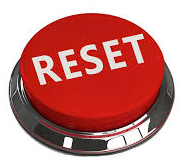 How many days have you had that have passed in a whirlwind of activity, stress and noise, and looking back you felt you could have done better? How many conversations have you been through that at the end you felt you might have let yourself down?
How many days have you had that have passed in a whirlwind of activity, stress and noise, and looking back you felt you could have done better? How many conversations have you been through that at the end you felt you might have let yourself down?
We all have behaviour patterns that are unhelpful, and we sometimes engage in that behaviour to the detriment of ourselves and others. However, every day is filled with opportunities to reset.- 86,400 seconds each represent an opportunity. If we’re awake for 2/3 of that time, that gives us more than 57,600 opportunities to stop and hit reset when things are not going well. We just need to recognise those opportunities and take them.
The difference between a good and a bad day is often characterised by our interactions with others, or by a series of events that impacts our mood positively or negatively. For example, starting the day stuck in traffic, arriving to work late (then realising we left our badge at home) we can become stressed and annoyed. However, that challenging start doesn’t have to define our day. We can stop, take a breath and eliminate the negative noise in our heads before it colours the rest of the day and impacts our interactions with others and our productivity. For example, this Fast Company article uses the term “reboot” to give some practical approaches to resetting.
Lately I often find myself stopping when talking with my teenage and pre-teen children and asking myself “What is the best outcome I can achieve from this conversation?” as a reminder to think differently during sometimes challenging discussions. I believe that this helps me be a better Dad, and reduces the likelihood that I will react negatively.
In a work context, having a discussion with a colleague that is veering into unproductive territory can be an opportunity to push the reset button, acknowledging that continuing the discussion will not lead to the right outcomes unless our approach changes.
It can also be helpful to break a pattern of procrastination – something most of us can indulge in at various points. I particularly like Tim Urban’s Ted talk and blog post on procrastination, and how for him the arrival of the “Panic Monster” effectively forces a reset and breaks the cycle for that instance.
Framing a “Why?” question in any scenario can also be a help in resetting in longer term endeavours. “Why am I not making time to exercise, when I know I should?” can enable us to address and reset a long-running pattern of avoidance. “Why do I persist in snacking when I know it’s adding to my waistline?” might help us break out of a cycle of snacking because we’re bored, or stressed, or upset. (You may be able to tell what is occupying a lot of my personal improvement thinking at the moment :))
“Why do I avoid having a difficult conversation with someone, and instead complain about them behind their back?” might force us to address a difficult relationship with someone at work or elsewhere in our lives and create a reset point that we can move forward positively from.
There are many ways to reset, and thousands of opportunities to do so, which if taken can help us reach our longer term goals. How do you plan to hit reset?
|
|

